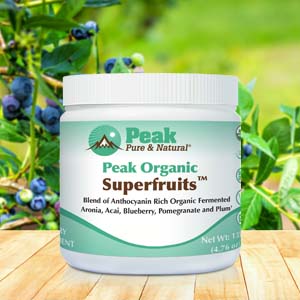For optimal health, it’s recommended you get four to five servings of vegetables and four to five servings of fruit every day.
If that sounds like a lot to you, you’re not alone. Most Americans are only eating one serving or less of fruits and vegetables every day.
These poor dietary habits are part of the reason the rate of type 2 diabetes is skyrocketing. An estimated 11.6 percent of the American population is currently living with type 2 diabetes, and that number will likely continue to grow if we don’t get our diets under control.
If overhauling your entire eating plan all at once seems overwhelming, I have good news for you. Lowering your type 2 diabetes risk could be as easy as adding these three foods to your diet — and only one daily serving is required for two of them…
Drink more tea, eat more apples and berries
Flavonoids are substances found in plant-based foods and beverages that have powerful health properties. Flavonoids such as anthocyanins, fisetin, quercetin and isoflavones can help defend against conditions inlcuding high blood pressure, inflammation, menopause and type 2 diabetes.
Researchers have discovered there are three foods, in particular, you should be eating if you really want to turbo-charge the diabetes-protective impact of these flavonoids: tea, berries and apples.
The researchers analyzed data gathered from 2006 to 2010 from 113,097 participants in the UK Biobank study. The participants’ flavonoid intake was measured through two or more 24-hour dietary surveys analyzed using the US Department of Agriculture databases.
Based on average daily consumption, the researchers selected 10 flavonoid-rich foods and calculated a Flavodiet Score (FDS) by adding up the servings of these foods. They then performed statistical analyses to assess the link between dietary flavonoid intake and development of type 2 diabetes.
They discovered a higher FDS equivalent to consuming six servings of flavonoid-rich foods daily was connected to a 28 percent lower risk of developing type 2 diabetes compared to a lower FDS of one serving daily.
Results also showed that each additional daily serving of flavonoid-rich foods cuts diabetes risk by 6 percent. And three foods in particular were found to slash diabetes risk:
- Four servings of black or green tea per day were associated with a 21 percent lower diabetes risk
- One daily serving of berries was linked to a 15 percent reduced diabetes risk
- One serving per day of apples was connected to a 12 percent lower diabetes risk
This is good news as the odds of developing type 2 diabetes continue to grow. And the older you get, the more at risk you are — practically one out of every two older Americans is on the cusp of type 2 diabetes.
Flavonoids lead to better blood sugar control and more
The study findings also indicate a diet rich in flavonoids positively affects weight management, glucose metabolism, inflammation and kidney and liver function, all of which contribute to the reduced type 2 diabetes risk.
Flavonoids, particularly anthocyanins, flavan-3-ols, and flavonols, can enhance insulin secretion and signaling and improve the transport and metabolism of glucose. This means that higher flavonoid intake can lead to greater insulin sensitivity and an improved blood lipid profile.
The researchers found certain people were more likely to engage in higher consumption of foods rich in flavonoids including women, older individuals and physically active participants.
Clearly, adopting a diet rich in flavonoids is a good move for staving off type 2 diabetes. So if you really want to turbo-charge the diabetes-protective impact of flavonoids, make sure you’re enjoying plenty of apples, berries and tea.
Sources:
Flavonoid-rich foods and drinks tied to an up to 28% lower risk of type 2 diabetes — Medical News Today
Higher habitual intakes of flavonoids and flavonoid-rich foods are associated with a lower incidence of type 2 diabetes in the UK Biobank cohort — Nutrition & Diabetes
National Diabetes Statistics Report — Centers for Disease Control and Prevention
The State Of The Plate: New Research Reveals America’s Fruit & Vegetable Consumption Is Eroding — Have a Plant
Read full article here




